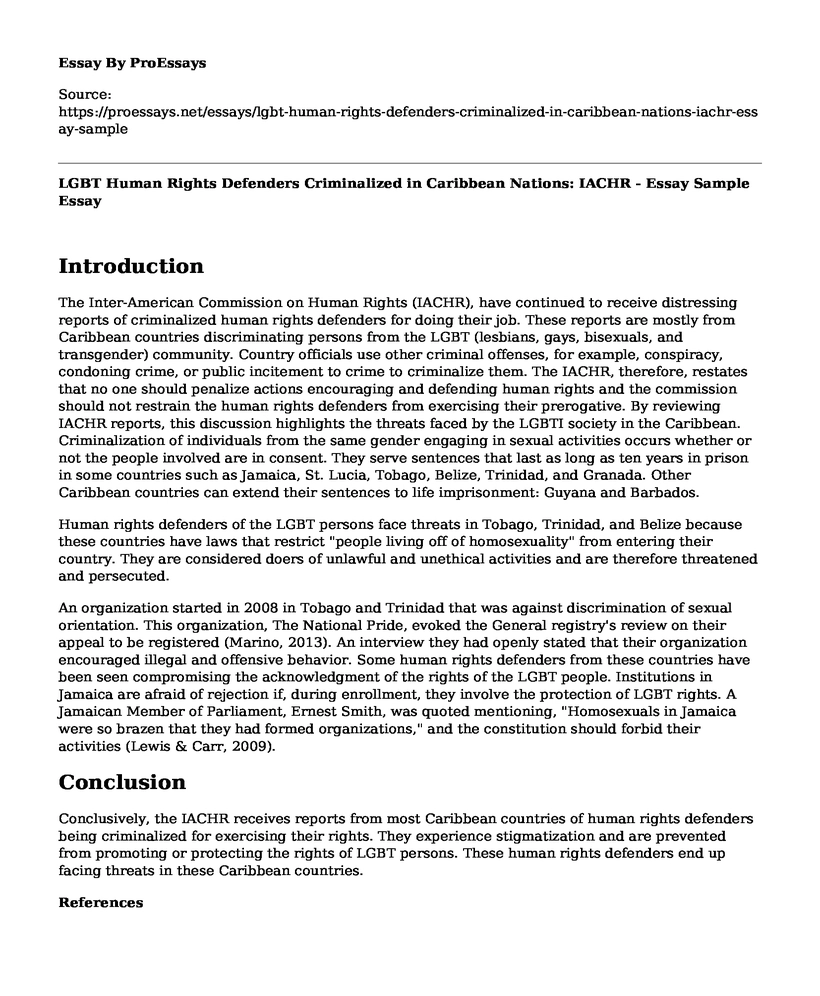Introduction
The Inter-American Commission on Human Rights (IACHR), have continued to receive distressing reports of criminalized human rights defenders for doing their job. These reports are mostly from Caribbean countries discriminating persons from the LGBT (lesbians, gays, bisexuals, and transgender) community. Country officials use other criminal offenses, for example, conspiracy, condoning crime, or public incitement to crime to criminalize them. The IACHR, therefore, restates that no one should penalize actions encouraging and defending human rights and the commission should not restrain the human rights defenders from exercising their prerogative. By reviewing IACHR reports, this discussion highlights the threats faced by the LGBTI society in the Caribbean. Criminalization of individuals from the same gender engaging in sexual activities occurs whether or not the people involved are in consent. They serve sentences that last as long as ten years in prison in some countries such as Jamaica, St. Lucia, Tobago, Belize, Trinidad, and Granada. Other Caribbean countries can extend their sentences to life imprisonment: Guyana and Barbados.
Human rights defenders of the LGBT persons face threats in Tobago, Trinidad, and Belize because these countries have laws that restrict "people living off of homosexuality" from entering their country. They are considered doers of unlawful and unethical activities and are therefore threatened and persecuted.
An organization started in 2008 in Tobago and Trinidad that was against discrimination of sexual orientation. This organization, The National Pride, evoked the General registry's review on their appeal to be registered (Marino, 2013). An interview they had openly stated that their organization encouraged illegal and offensive behavior. Some human rights defenders from these countries have been seen compromising the acknowledgment of the rights of the LGBT people. Institutions in Jamaica are afraid of rejection if, during enrollment, they involve the protection of LGBT rights. A Jamaican Member of Parliament, Ernest Smith, was quoted mentioning, "Homosexuals in Jamaica were so brazen that they had formed organizations," and the constitution should forbid their activities (Lewis & Carr, 2009).
Conclusion
Conclusively, the IACHR receives reports from most Caribbean countries of human rights defenders being criminalized for exercising their rights. They experience stigmatization and are prevented from promoting or protecting the rights of LGBT persons. These human rights defenders end up facing threats in these Caribbean countries.
References
Marino, C. B. (2013). ANNUAL REPORT OF THE INTER-AMERICAN COMMISSION ON HUMAN RIGHTS.
Lewis, R. A., & Carr, R. (2009). Gender, sexuality and exclusion: Sketching the outlines of the Jamaican popular nationalist project. Caribbean Review of Gender Studies, 3, 1-22.
Cite this page
LGBT Human Rights Defenders Criminalized in Caribbean Nations: IACHR - Essay Sample. (2023, Feb 25). Retrieved from https://proessays.net/essays/lgbt-human-rights-defenders-criminalized-in-caribbean-nations-iachr-essay-sample
If you are the original author of this essay and no longer wish to have it published on the ProEssays website, please click below to request its removal:
- The Effectiveness of Evidence-Based Juvenile Justice Programs - Research Paper
- Forensic Psychological Guidelines and Ethics Essay
- Essay Sample on Impacts the Travel Ban Policy on Illegal Immigrants
- Paper Example on Criminal Scenarios
- Essay on Chimps vs. Humans: The USNhRP's Rights Movement for Nonhumans
- Essay on Crimes of the Powerful: Understanding Their Impact on Society
- Crime Scene Search: Methods for Homicide Investigations - Report Example







